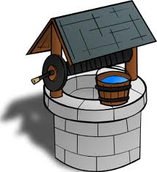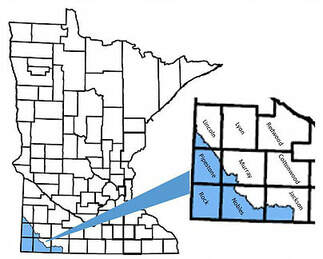One Watershed One Plan - Missouri River Basin
|
The Missouri River Watershed One-Watershed One Plan brings 6 counties, 6 Soil and Water Conservation Districts and 2 Watersheds together to develop a comprehensive plan that will address water management in the Missouri River Watershed. Prior to this evolutionary process each public entity developed their own strategic water plan. This new process will build off these existing local water management plans and priorities as well as align the local water planning process on major watershed boundaries. The Missouri River Watershed One Watershed-One Plan will be locally led and utilize state strategies towards prioritized, targeted and measurable implementation plans.
|
Further information for this plan is currently hosted on the Nobles SWCD site.
Click here for further information
Click here to view the Current Rock County Water Plan
Click here to view Rock County Water Plan Maps
Click here to view Rock County Water Plan Maps
Minnesota Department of Agriculture’s (MDA) Groundwater Protection Rule
The Groundwater Protection Rule minimizes potential fertilizer sources of nitrate pollution to the state’s groundwater and works with local farmers to prevent public water supply wells from exceeding the drinking water standard for nitrate. The rule was developed following a multi-year process with extensive stakeholder input.
The rule restricts the application of nitrogen fertilizer in the fall and to frozen soil in areas vulnerable to contamination beginning September 1, 2020. This will also apply to Drinking Water Supply Management Areas (DWSMAs) with elevated nitrate. In Southwest Minnesota this currently includes DWSMA’s for the City of Adrian, City of Balaton, City of Chandler, City of Edgerton, City of Ellsworth, Lincoln Pipestone Rural Water’s (LPRW) Holland, North Holland and Verdi wellfields, and Rock County Rural Water System.
Additionally, in DWSMAs with nitrate greater than or equal to 8 mg/L (parts per million), the MDA will begin forming local advisory teams with local farmers, agronomists, and other local members. The teams will be involved in reviewing, considering, and advising the MDA on appropriate management practices to reduce nitrate in community water systems. Local advisory teams are important because the goal is to involve local farmers and agronomists in problem-solving to address elevated levels of nitrate in groundwater.
For more information, including maps and a list of DWSMAs impacted by the rule visit: www.mda.state.mn.us/nfr
For more information, contact MDA staff: Russ Derickson, 507-752-7036, [email protected] (LPRW, Edgerton) or Kevin Hauth, 507-822-4175, [email protected] (Rock County Rural Water, Ellsworth, Adrian)
The rule restricts the application of nitrogen fertilizer in the fall and to frozen soil in areas vulnerable to contamination beginning September 1, 2020. This will also apply to Drinking Water Supply Management Areas (DWSMAs) with elevated nitrate. In Southwest Minnesota this currently includes DWSMA’s for the City of Adrian, City of Balaton, City of Chandler, City of Edgerton, City of Ellsworth, Lincoln Pipestone Rural Water’s (LPRW) Holland, North Holland and Verdi wellfields, and Rock County Rural Water System.
Additionally, in DWSMAs with nitrate greater than or equal to 8 mg/L (parts per million), the MDA will begin forming local advisory teams with local farmers, agronomists, and other local members. The teams will be involved in reviewing, considering, and advising the MDA on appropriate management practices to reduce nitrate in community water systems. Local advisory teams are important because the goal is to involve local farmers and agronomists in problem-solving to address elevated levels of nitrate in groundwater.
For more information, including maps and a list of DWSMAs impacted by the rule visit: www.mda.state.mn.us/nfr
For more information, contact MDA staff: Russ Derickson, 507-752-7036, [email protected] (LPRW, Edgerton) or Kevin Hauth, 507-822-4175, [email protected] (Rock County Rural Water, Ellsworth, Adrian)

Disinfecting Flooded Wells:
If a well casing has been submerged in flood water the well should be considered contaminated by bacteria or viruses which can make you ill. Any water used for drinking or cooking MUST BE BOILED FOR AT LEAST 5 MINUTES (or bottled water used) until the well and entire plumbing system have been disinfected and tested. For further information please visit the MN Dept of Health at the link below.
Water Test Kits: Well water test kits are available to Rock County residents free of charge. Residents can pick up their test kits at the SWCD office. Samples from these kits are mailed by residents to MVTL Laboratories in New Ulm for testing.
Well Sealing Cost Share:
State Cost Share funds are available to assist landowners with the cost of sealing unused wells. Funds are available for up to 50% of the cost or $300 whichever is less. Wells must be sealed by a licensed well sealer. Call our office to have your name put on the cost share list, bring us a copy of your paid bill to be reimbursed. It's that simple!
State Cost Share funds are available to assist landowners with the cost of sealing unused wells. Funds are available for up to 50% of the cost or $300 whichever is less. Wells must be sealed by a licensed well sealer. Call our office to have your name put on the cost share list, bring us a copy of your paid bill to be reimbursed. It's that simple!
Precipitation Monitoring: The SWCD in conjunction with the State Climatology Office monitors site specific precipitation throughout Rock County. The data collected provides citizens and the State of Minnesota with important precipitation information and weather history.


